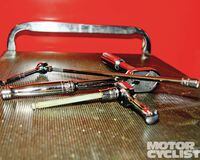Sockets are the staple of any toolbox. A single drawer full of assorted sizes gives you a lot of options, and amazing flexibility in reaching fasteners. Sockets can be used with ordinary ratchets, breaker bars, T-handles or power tools. And they’re inexpensive: Even premium brands like the Snap-On tools we use in the Motorcyclist shop can be had at reasonable prices.
A well-equipped set will feature sockets in ¼-, 3/8- and ½-inch drive sizes. The ¼-inch sockets fit small fasteners and reach into tight areas best, but are limited in size and the torque they can handle. The 3/8-inch drive sockets are a little larger and able to handle bigger loads, but are still compact and light. Half-inch drive sockets are heavy enough to handle the largest jobs on most motorcycles. Ideally, you will have these sockets in regular and deep versions. If you’re just getting started, the best choice is a six-point socket set: With the socket embracing each flat on a fastener completely, you’ll have less chance of rounding off the corners. If you have a more comprehensive toolbox you’ll want some 12-point sockets, which make grasping fasteners with limited access easier. Plus some motorcycles are equipped with 12-point fasteners—the brake-line banjo bolts on Harley-Davidsons, for example. Speaking of Harleys, you’ll need to know whether the bike you’ll be working on uses metric or standard sizes. Almost all are metric nowadays, but there are exceptions.
Finally, if you use power tools, you’ll want some impact-type sockets. These are generally made from less brittle alloys, and finished in matte-black instead of chrome-plated. Chrome can chip and fly off under the force of an impact, and thin-walled sockets can shatter or crack. Conversely, impact sockets are perfectly safe to use with hand tools, so those on a budget may want to go with them. The only drawback is the thicker-walled impact sockets might not fit into tight areas.

/cloudfront-us-east-1.images.arcpublishing.com/octane/D2BDYKKNZ5GRHGDMI4PZTGRMME.jpg)

/cloudfront-us-east-1.images.arcpublishing.com/octane/UAY4WSZPOFDQRP4MCEXAKDFQOQ.jpg)

/cloudfront-us-east-1.images.arcpublishing.com/octane/X5CE3KSJHZHM5CUFGPZ7U26WB4.jpg)
/cloudfront-us-east-1.images.arcpublishing.com/octane/COWLTPGFAFGDDGJCTENYMA4VJM.jpg)
/cloudfront-us-east-1.images.arcpublishing.com/octane/H3PKUGPSUJFTND4RFPSI4OIDCE.jpg)
/cloudfront-us-east-1.images.arcpublishing.com/octane/UHGQA3MQDFCA3HLBWF7S76WH6Y.jpg)
/cloudfront-us-east-1.images.arcpublishing.com/octane/Q5EORCSTNFAVBJC4IYUHIKJTXQ.jpg)
/cloudfront-us-east-1.images.arcpublishing.com/octane/XIJ5FUFSP5A3NL7MOVZGJXAHC4.jpg)
/cloudfront-us-east-1.images.arcpublishing.com/octane/V5NZN3CGS5B5PPYFYJHIPAU5S4.jpg)
/cloudfront-us-east-1.images.arcpublishing.com/octane/CZE6ONOBU5E7HPIEEADU376C4M.jpg)
/cloudfront-us-east-1.images.arcpublishing.com/octane/UT4KL3SIYJBSPNHWJXTBE6MTGE.jpg)
/cloudfront-us-east-1.images.arcpublishing.com/octane/Q3UOIDZ22ZEVDBZUWGJXIMGJKI.jpg)
/cloudfront-us-east-1.images.arcpublishing.com/octane/YQM66WXZV5AAXNNOIUVOGVXZMY.jpg)
/cloudfront-us-east-1.images.arcpublishing.com/octane/J47NFTXNLFFGHELHZCUD2LCITA.jpg)
/cloudfront-us-east-1.images.arcpublishing.com/octane/NXPQBTLX3NCILKQ2GCFJYNIDEM.jpg)
/cloudfront-us-east-1.images.arcpublishing.com/octane/6U7NJLAYMRBZTIGNKWIA5OK2FQ.jpg)
/cloudfront-us-east-1.images.arcpublishing.com/octane/IYTZQWUROVC25IMTDEWUDQ5IQE.jpg)
/cloudfront-us-east-1.images.arcpublishing.com/octane/YJODDXEL2ZB5TENKPPN4BEYJAE.jpg)
/cloudfront-us-east-1.images.arcpublishing.com/octane/QEQQUZYNJFAIJB4DZFVFSNTCQ4.jpg)
/cloudfront-us-east-1.images.arcpublishing.com/octane/F4EEHDT3UZFKPLKVGDWMMPFEQE.jpg)
/cloudfront-us-east-1.images.arcpublishing.com/octane/J47U6OWNLBFBBG75A3ILAKFYZU.jpg)
/cloudfront-us-east-1.images.arcpublishing.com/octane/XWWQYTL3J5B7LKXDI354FFF4NQ.jpg)